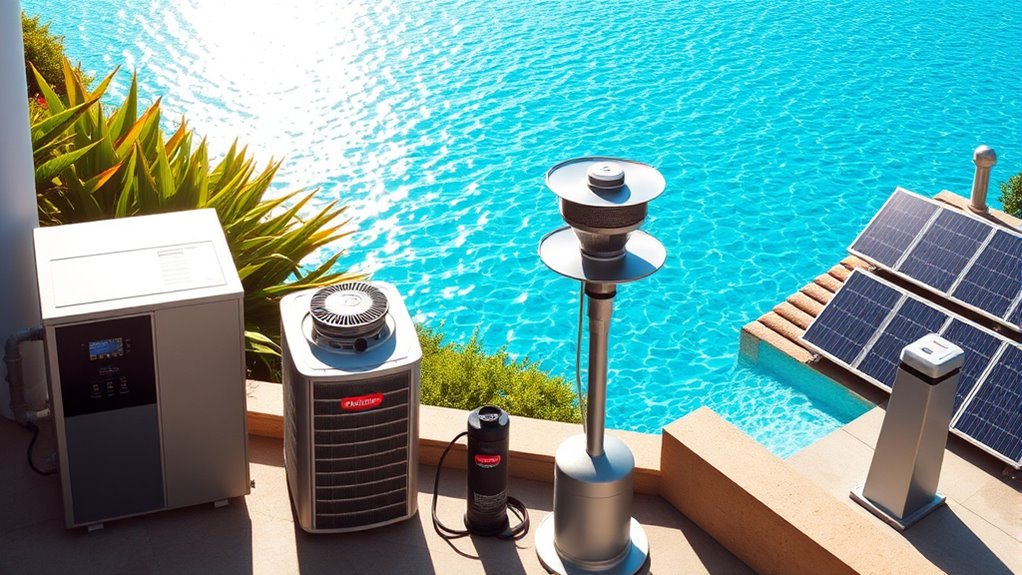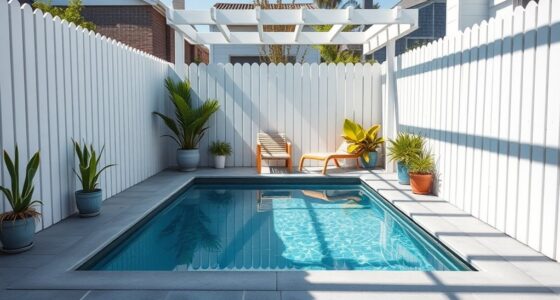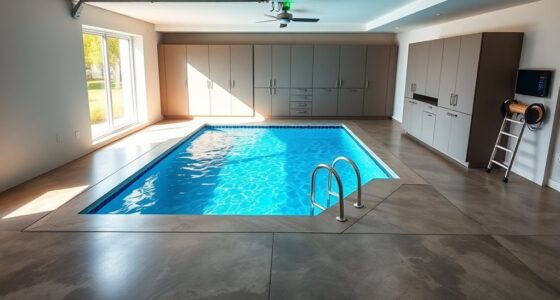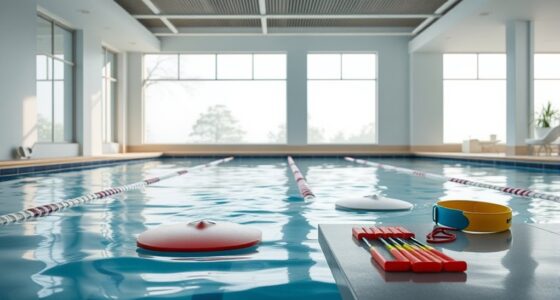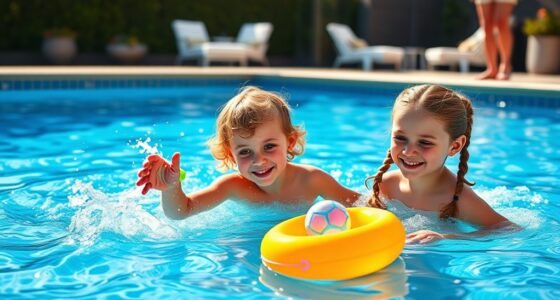Choosing the best way to heat your endless pool depends on your climate, budget, and eco goals. Heat pumps are efficient and eco-friendly, providing consistent warmth with low operating costs—great for moderate climates. Gas heaters heat quickly but produce emissions and require ventilation, making them suitable for year-round use in colder areas. Solar options are sustainable and cost-effective but depend on sunlight. Keep exploring to find the perfect fit for your pool and lifestyle.
Key Takeaways
- Heat pumps offer energy-efficient, quiet heating suitable for moderate climates and year-round use with low maintenance.
- Gas heaters provide rapid, reliable warmth ideal for quick pool heating but require proper ventilation and have higher emissions.
- Solar heating is eco-friendly with minimal operating costs but depends on sunlight and requires adequate panel installation for efficiency.
- Consider climate, pool usage frequency, and environmental values when choosing between systems to optimize cost and performance.
- Regular maintenance and adherence to safety standards ensure system durability, safety, and optimal pool heating efficiency.
How Heat Pumps Work and Their Benefits
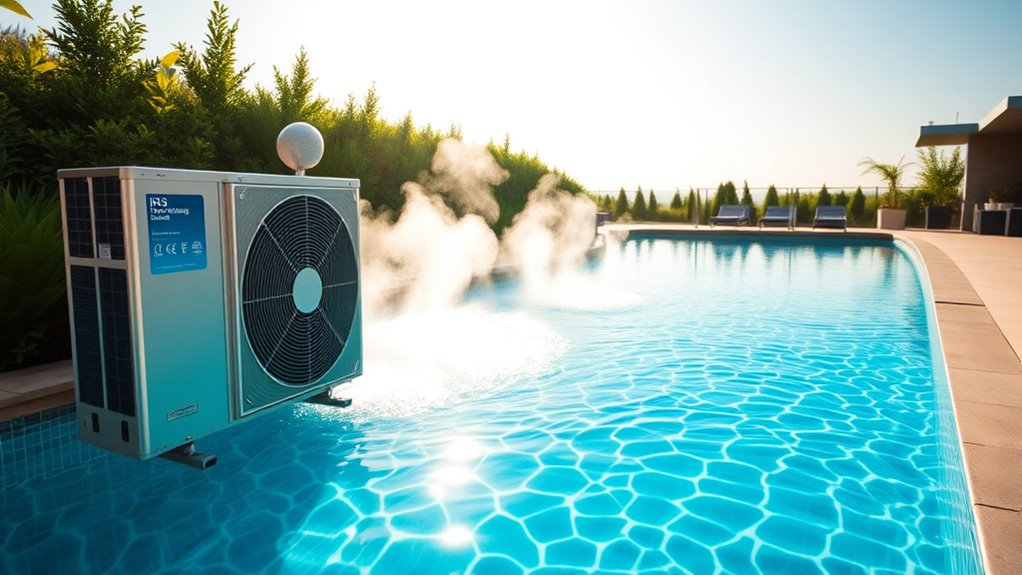
Heat pumps work by transferring heat from one place to another, even in cold weather, making them an efficient way to heat and cool your home. They use a refrigerant cycle to absorb heat from the outside air and move it inside to warm your space. In cooling mode, they reverse the process, removing heat from your home and releasing it outside. This cycle allows heat pumps to provide consistent temperature control with less energy compared to traditional systems. They operate quietly and require less maintenance, making them a convenient choice. Additionally, because they don’t burn fuel, they produce fewer emissions, which is better for the environment. Furthermore, heat pumps can be integrated with dynamic communication exercises to optimize system performance and user comfort. Overall, heat pumps offer a reliable, eco-friendly, and cost-effective way to maintain a comfortable indoor climate year-round.
Advantages and Disadvantages of Gas Heaters
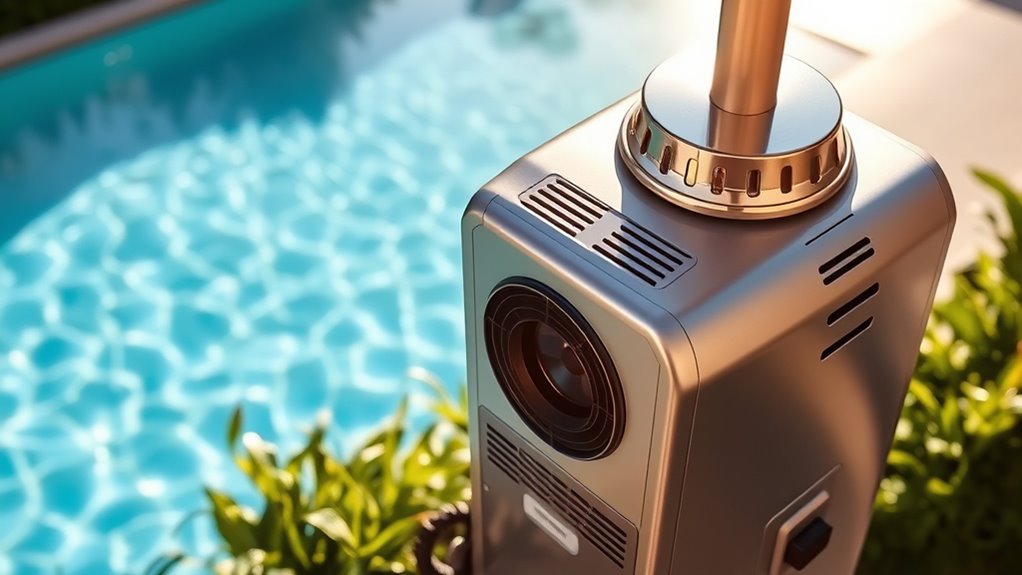
Gas heaters offer quick and reliable warmth, making them a popular choice for many homeowners. They heat your pool rapidly, so you can enjoy swimming sooner. Gas heaters are effective in colder climates, maintaining consistent water temperature even during chilly weather. They tend to be more affordable upfront compared to some other options, and their simple design means easy maintenance. Additionally, they produce emissions, contributing to environmental concerns. They also tend to be noisier than heat pumps or solar systems. If you need fast, dependable heating and don’t mind higher fuel costs or emissions, gas heaters can be a practical solution for your endless pool. Portable camping toilets can be a helpful addition if you’re setting up a temporary outdoor heating station or relaxing area near your pool.
Solar Heating Systems: An Eco-Friendly Choice
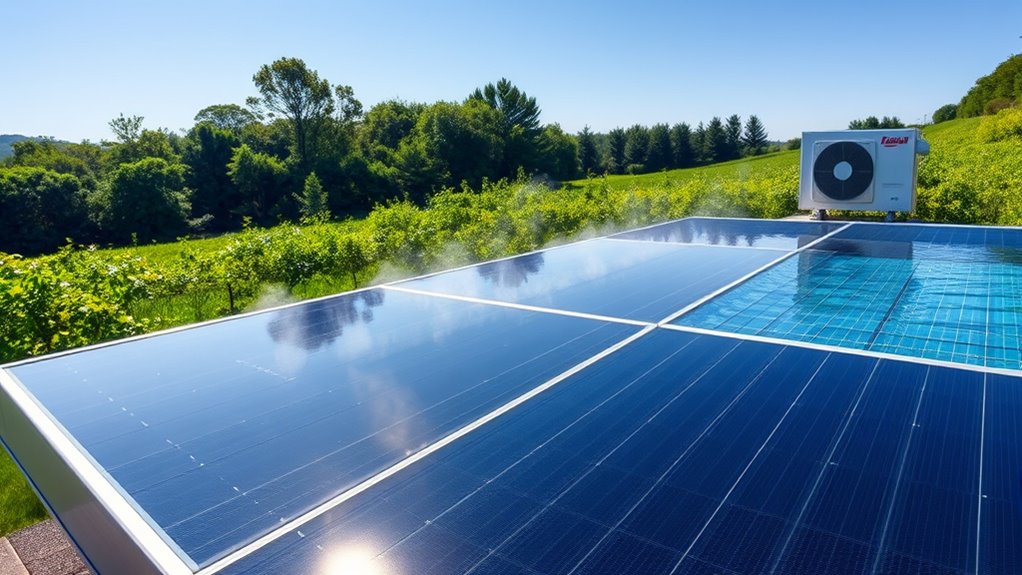
Solar heating systems use sunlight to warm your home efficiently, and their panel technology continues to improve. They offer significant environmental benefits by reducing carbon emissions and reliance on fossil fuels. While initial costs can be high, low maintenance and long-term savings make them an appealing eco-friendly choice. Incorporating preppy dog names inspired by fashion and culture can add a touch of style to your outdoor space, complementing your eco-friendly heating setup.
Solar Panel Efficiency
Have you ever wondered how efficiently solar panels convert sunlight into usable energy? Solar panel efficiency measures how well they turn sunlight into electricity, directly impacting your energy output. Higher efficiency panels capture more sunlight, meaning you’ll need fewer panels to heat your pool. Factors affecting efficiency include the quality of the photovoltaic cells, the angle at which panels are installed, and shading or dirt buildup. Modern panels typically range from 15% to over 22% efficiency. While higher-rated panels cost more upfront, they can save you money over time by generating more energy. Keep in mind that efficiency can decline slightly over the lifespan of the panel, but proper maintenance and installation optimize performance. Choosing high-efficiency panels maximizes your solar investment and helps keep your pool warm sustainably. Proper installation techniques can further enhance the overall efficiency and lifespan of your solar heating system.
Environmental Impact Benefits
Switching to solar heating systems markedly reduces your environmental footprint by cutting down on greenhouse gas emissions. Solar energy is renewable and produces no air pollutants during operation. This leads to a significant reduction in air pollution, further benefiting both local and global environments. Solar systems have a minimal impact on local ecosystems compared to fossil fuels. They generate clean energy without depleting natural resources. Here’s a quick comparison:
| Benefit | Impact |
|---|---|
| Emissions | Significantly lower than traditional fuels |
| Resource depletion | Uses renewable sunlight |
| Ecosystem disturbance | Minimal, unlike drilling or mining |
Cost and Maintenance
Investing in solar heating systems can be an economical choice with relatively low ongoing costs. Once installed, solar panels require minimal maintenance—just periodic cleaning to ensure peak efficiency. Unlike gas or heat pump systems, solar setups don’t have moving parts that wear out quickly, reducing repair needs over time. You’ll mainly need to check for debris or shading that could affect performance. The initial investment might seem high, but many regions offer incentives or rebates that lower upfront costs. Over the long term, solar saves you money on energy bills, making it a cost-effective solution. Additionally, solar heating reduces reliance on fossil fuels, contributing to a cleaner environment. Plus, with proper upkeep, your system can last 20 years or more, providing reliable, eco-friendly heating for your pool with minimal ongoing expenses.
Comparing Efficiency and Operating Costs
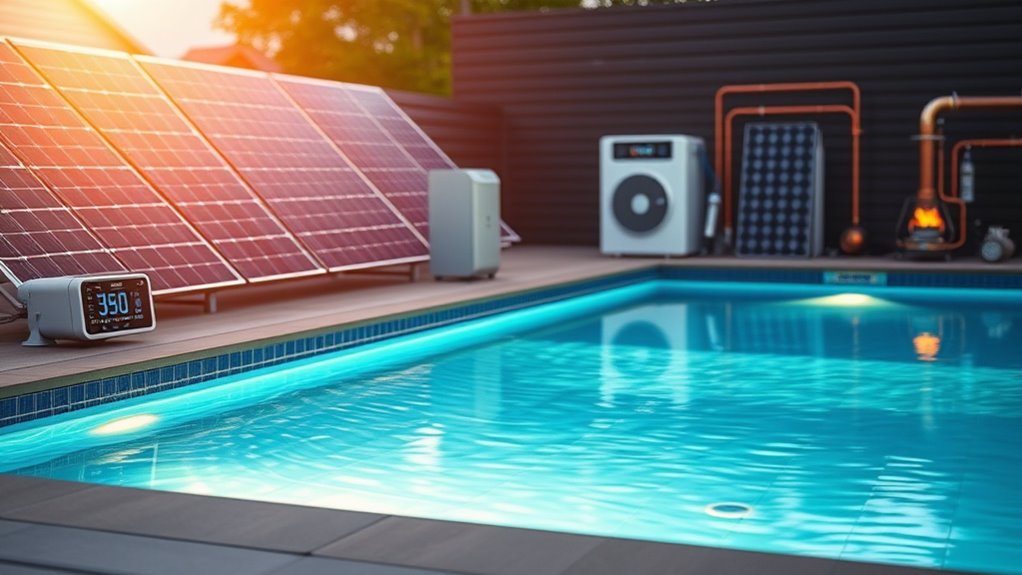
When comparing the efficiency and operating costs of heat pumps, gas systems, and solar solutions, it’s essential to look beyond the upfront costs. Heat pumps often have high efficiency, converting electricity into heat at a 3-4 times better rate than gas. Gas systems can be less efficient, especially during mild weather. Solar options depend on sunlight, but once installed, their ongoing costs are minimal. Here’s a quick comparison:
| Method | Efficiency | Operating Cost | Maintenance Needs |
|---|---|---|---|
| Heat Pump | High (3-4x electric) | Moderate | Low |
| Gas | Moderate | High (fuel costs) | Moderate |
| Solar | Varies (dependent on sun) | Very low | Low |
Choosing wisely depends on your energy prices and climate. Additionally, understanding retirement tax implications can help you better plan your energy investments for long-term savings.
Environmental Impact of Each Heating Method
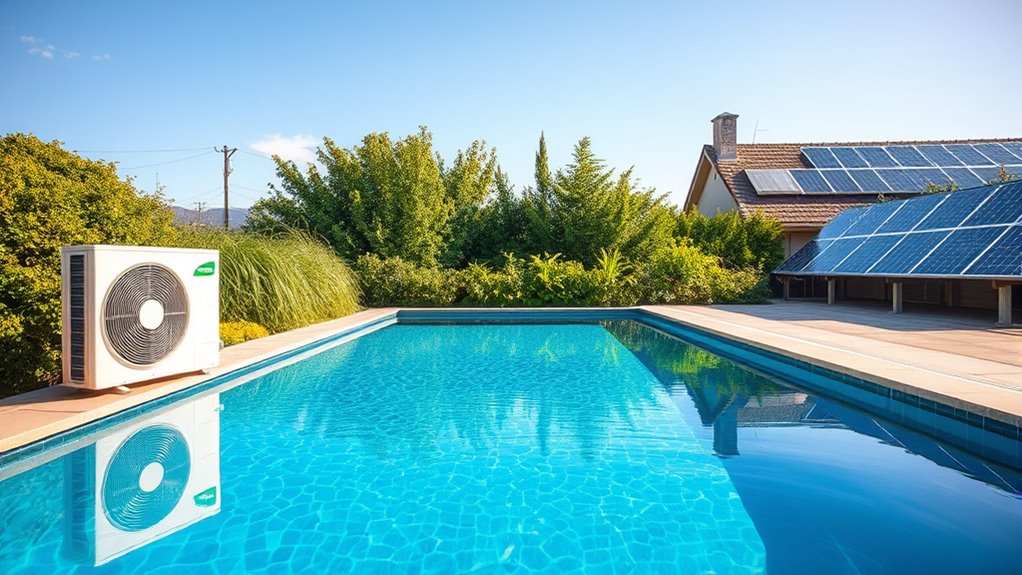
Each heating method impacts the environment differently, shaping your overall carbon footprint. Heat pumps are highly efficient and produce minimal emissions since they transfer heat rather than generate it directly. They rely on electricity, which can be renewable or fossil-fuel-based, affecting their environmental friendliness. Gas heaters burn natural gas, emitting carbon dioxide and other pollutants, contributing to greenhouse gases and air quality issues. Solar heating uses sunlight, a renewable resource, making it the most eco-friendly option with zero emissions during operation. However, manufacturing and installing solar panels involve energy use and resource extraction. Understanding the environmental impact of each method can help you make more sustainable choices. Overall, heat pumps and solar systems tend to have lower environmental impacts, especially if powered by renewable energy, while gas heating leaves a larger carbon footprint, impacting climate change and local air quality.
Installation and Maintenance Considerations
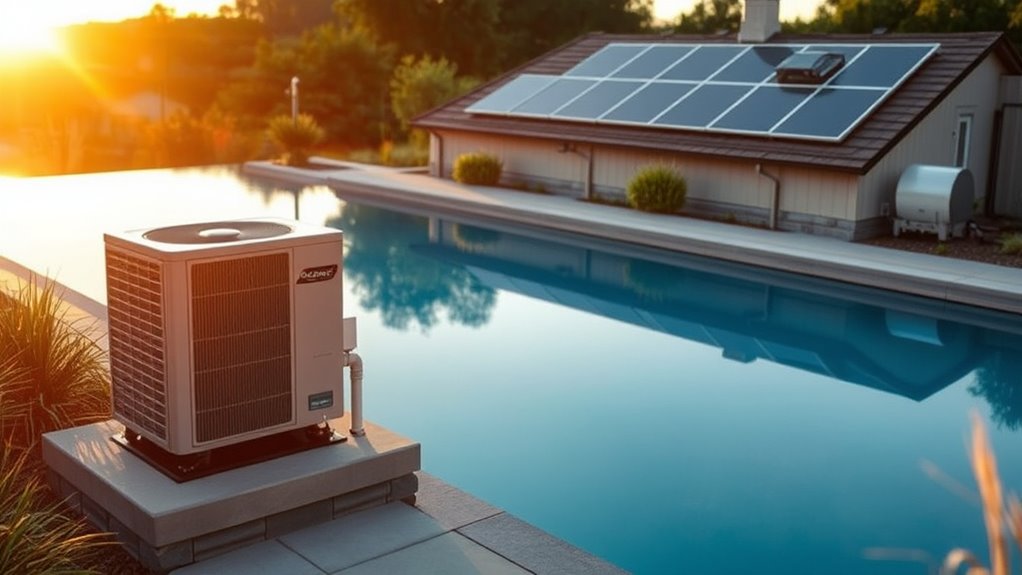
Installing and maintaining heating systems requires careful planning to guarantee they operate efficiently and safely. First, consider space requirements and accessibility for regular upkeep. For heat pumps, ensure proper airflow around the unit to prevent overheating and optimize performance. Gas systems need proper ventilation to prevent dangerous fumes buildup, so check local codes and install exhaust outlets correctly. Solar heating systems require clear sun exposure and secure mounting structures, plus regular inspections of panels and connections. Routine maintenance includes cleaning filters, checking for leaks, and ensuring electrical connections are secure. Stay vigilant about corrosion, especially with gas and solar systems, and schedule professional inspections annually. Proper installation and maintenance not only extend your system’s lifespan but also keep your pool heating safe and reliable.
Making the Best Choice for Your Pool and Lifestyle
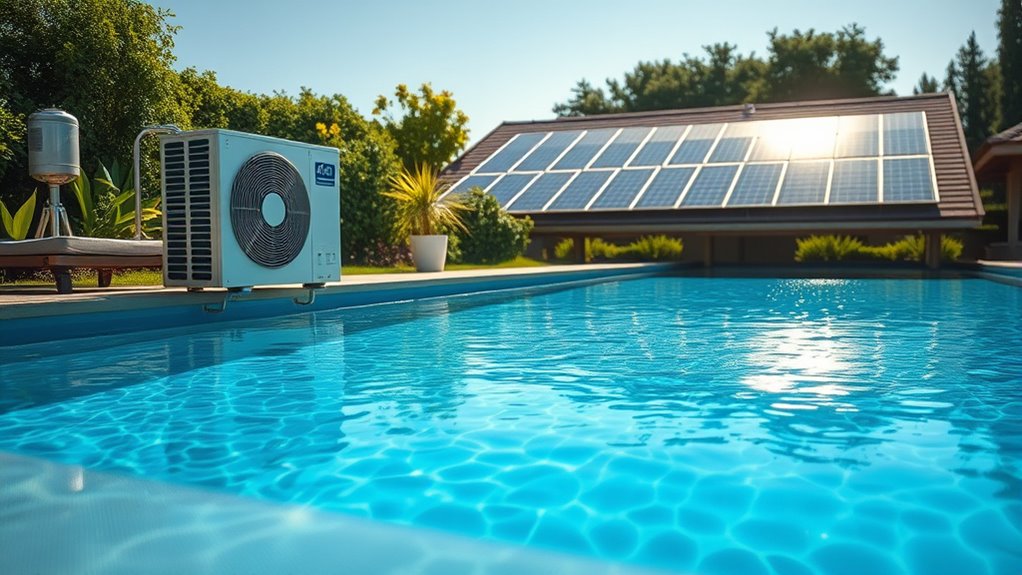
Choosing the right heating system depends on your pool size, climate, and personal preferences. Consider how often you use your pool and your desired temperature consistency. If you swim year-round in a colder climate, a gas heater offers quick, reliable warmth but can be costly to operate. Solar heating is eco-friendly and inexpensive in the long run but works best in sunny regions and may take longer to heat your pool. Heat pumps strike a balance, providing efficient, consistent warmth in moderate climates. Think about your budget, energy sources, and maintenance willingness. Your lifestyle also matters—if you want low effort, a heat pump or solar might suit you better. Ultimately, choosing the right system aligns with your usage patterns, environmental values, and financial considerations.
Frequently Asked Questions
What Is the Typical Lifespan of Each Heating System?
You can expect a heat pump to last around 10 to 15 years with proper maintenance. Gas heaters typically last 8 to 12 years, depending on usage and upkeep. Solar heating systems can last 15 to 20 years or more, especially with good care. Regular inspections and timely repairs help maximize the lifespan of any system, ensuring you get the most out of your investment.
How Do Weather Conditions Affect Heating Performance?
Weather can be a gentle reminder that your pool’s heating performance may not always be as consistent as you’d like. Cold or windy conditions tend to slow down heat transfer, making it harder to maintain your desired temperature. Sunny days can give a warm boost, especially for solar heating, while extreme weather might demand a little extra patience or supplementary heating. Embrace these natural shifts as part of the seasonal dance.
Are There Any Safety Concerns With Gas or Solar Heaters?
Yes, there are safety concerns with gas and solar heaters. Gas heaters pose risks like carbon monoxide leaks, which can be deadly if not properly ventilated. Solar heaters, while safer, can become very hot and cause burns if touched. Always guarantee proper installation, ventilation, and regular maintenance. Keep children and pets away from hot surfaces, and follow manufacturer guidelines to minimize hazards and enjoy your pool safely.
Can These Systems Be Integrated With Smart Home Technology?
Yes, these systems can be integrated with smart home technology. You can connect gas, solar, or heat pump heaters to your smart home system, allowing you to control heating settings remotely via smartphone or voice commands. Many modern heaters come with compatible apps or smart home interfaces, giving you convenience and energy management. Just confirm your chosen system supports smart integration before installation for seamless control and automation.
What Are the Long-Term Maintenance Costs for Each Option?
Think of maintenance costs as a garden you tend to over time. Gas heaters usually have higher long-term costs due to regular fuel purchases and part replacements. Heat pumps tend to be more economical, with lower upkeep and energy bills, but may need occasional repairs. Solar systems have minimal ongoing costs but require periodic inspections and potential panel cleaning. Overall, heat pumps strike a good balance between affordability and ease of maintenance.
Conclusion
Choosing the right heating method is like painting a picture of your ideal pool experience. Whether you prefer the quiet efficiency of a heat pump, the quick warmth of gas, or the green promise of solar, each option shapes your backyard oasis. Think of your decision as selecting the perfect brushstroke—each adds color to your pool’s future. Ultimately, your choice crafts a haven where warmth and sustainability blend seamlessly, turning your pool into a lifelong masterpiece.

